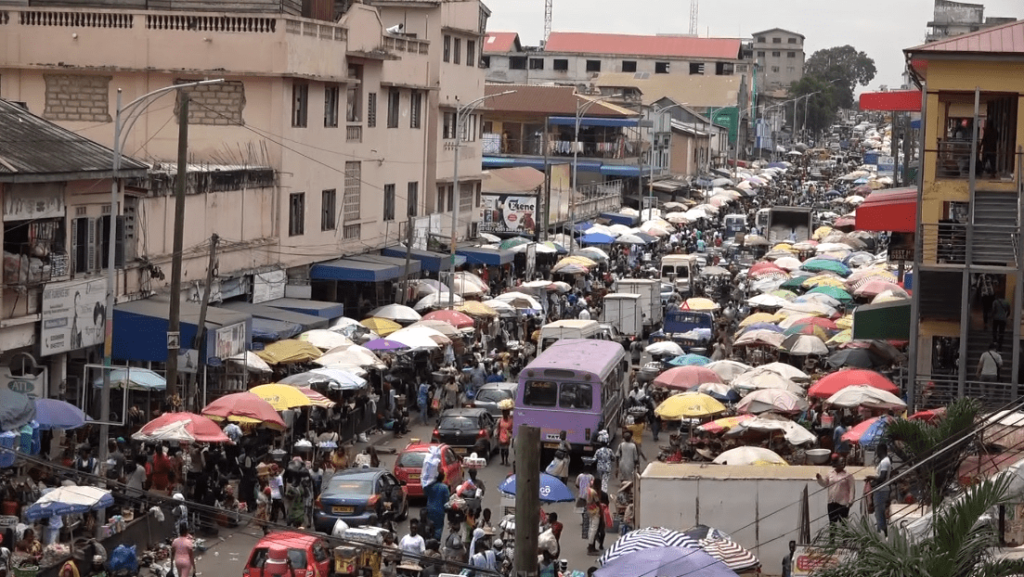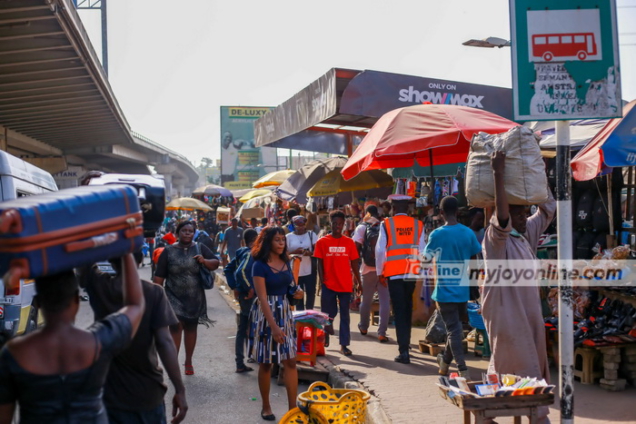
Audio By Carbonatix
Accra, the capital city of Ghana, has undergone rapid urbanisation and commercialisation, leading to significant changes in land use and a loss of indigenous spaces, particularly for the Ga people, the city’s original inhabitants.
The expansion of Accra’s central business district (CBD) and the commercialisation of key areas have led to a situation where many Ga communities now face the risk of losing all their traditional lands.
This urban expansion, while necessary for economic growth, presents severe socioeconomic risks to the Ga people in terms of accommodation and long-term economic sustainability.
The ongoing land mismanagement, particularly in the central areas of Accra, has resulted in a dire space crisis. Many residents of Ga communities, such as those in the CBD, now find themselves living in overcrowded conditions. A growing number of people are forced to sleep in shifts, on the streets, and in informal spaces, with inadequate sanitation facilities due to the acute shortage of land for building homes and essential infrastructure like toilets.
This crisis is further exacerbated by the mismanagement of land by local leaders who have sold land indiscriminately, contributing to the loss of valuable space and disrupting the socioeconomic fabric of the community.
To address these challenges, it is imperative that the government intervene through strategic urban planning and land engineering initiatives that specifically account for the needs and rights of the Ga people. This should be done with an eye toward sustainable development, ensuring that urban growth does not come at the expense of the city’s indigenous populations.
Currently, several areas in the CBD—Timber Market, Mokola, Agbogbloshie, Kantamanto, and high-street developments—are no longer fit for purpose. These areas, once vital hubs of economic activity, are now plagued by congestion, inadequate infrastructure, and informal trading. Many formal businesses, including financial institutions, have relocated to better-planned areas, highlighting the unsustainable nature of the current urban setup.
Read also: Accra: Traders take over bus stops
Visiting the city centre, or even attempting to take foreign guests to experience the heart of Accra, has become an increasingly tedious, uncomfortable, and embarrassing experience. The combination of choking traffic, disorganized street vendors, overcrowded sidewalks, and informal markets spilling into roads makes navigating the city a nightmare.
Visitors are often forced to witness the stark contrast between the chaotic, unkempt streets and the modern infrastructure that is slowly abandoning the area. For those unfamiliar with the city, finding a parking space or avoiding the litter and filth that often adorns the city centre can quickly turn a pleasant outing into a frustrating, sometimes disgusting, ordeal. Foreign guests, expecting to see the vibrant, thriving centre of a bustling city, often find themselves questioning what has become of Accra’s urban core.
The stark realities of overcrowding, inadequate sanitation, and the ever-present risks of fire hazards and accidents paint a disheartening picture for both locals and visitors alike.
The recent fire outbreak in Kantamanto, which devastated traders’ investments and caused significant distress, underscores the urgent need for comprehensive redevelopment. These informal markets, characterized by overcrowding and high fire risk, must be relocated to newly developed commercial zones on the outskirts of Accra. This will not only reduce city-centre congestion but also create modern commercial spaces capable of meeting today’s economic demands.
At the same time, key government properties—such as the burnt Ministry of Foreign Affairs building and other state-owned assets—should be repurposed with the Ga people’s rights and needs in mind. These properties could become mixed-use spaces that preserve cultural and historical identity while integrating the Ga community into Accra’s modern economic landscape.

A crucial aspect of this redevelopment process should be the introduction of Heritage Impact Assessments (HIA) as a mandatory component in urban planning and development.
A Heritage Impact Assessment is an evaluative tool that assesses the potential impact of proposed developments on cultural heritage sites, practices, and values. In the case of Accra, this would not only involve the preservation of tangible heritage sites but also the intangible cultural practices and values that form the core of the Ga identity.
The incorporation of HIA into urban planning would ensure that new developments do not infringe upon the historical and cultural fabric of the Ga people, but rather celebrate and integrate their heritage into the city's modern development.
The value of conducting HIAs lies in their ability to safeguard both historical and tourism assets. Many of Accra’s landmarks, including traditional Ga settlements, sacred sites, and cultural practices, are of immense historical and tourism significance. Properly integrated heritage management can attract global interest and contribute to the sustainable development of cultural tourism.
Preserving these elements would not only benefit the Ga people but also enhance Accra's international reputation as a city that respects its history and offers a rich cultural experience for visitors. The city’s rich cultural heritage, if carefully protected, has the potential to become a key pillar of its tourism strategy, offering opportunities for sustainable income, job creation, and cultural exchange.
Critically, any space vacated by relocating informal markets must be reallocated fairly and transparently, free from political influence or favoritism. This equitable distribution of land for housing, commerce, and community projects would restore a sense of ownership and security among Ga residents, ensuring the sustainability and vitality of their communities.
Such strategic relocation and repurposing, coupled with the introduction of Heritage Impact Assessments, would yield multiple benefits. It would decongest the city, improve living conditions and public health, foster economic growth through well-organized markets, and resolve longstanding social challenges faced by Ga communities.
Moreover, it would provide a clear framework for ensuring that the Ga heritage is protected and enhanced amidst urban growth. Through careful, inclusive planning, Accra can remain both a thriving capital and a place where its original inhabitants retain their heritage, dignity, and future prospects.
Written by Kwame Sowu, Entrepreneur & Project Management Expert
Latest Stories
-
Ghana’s global image boosted by our world-acclaimed reset agenda – Mahama
1 minute -
Full text: Mahama’s New Year message to the nation
2 minutes -
The foundation is laid; now we accelerate and expand in 2026 – Mahama
22 minutes -
There is no NPP, CPP nor NDC Ghana, only one Ghana – Mahama
24 minutes -
Eduwatch praises education financing gains but warns delays, teacher gaps could derail reforms
37 minutes -
Kusaal Wikimedians take local language online in 14-day digital campaign
1 hour -
Stop interfering in each other’s roles – Bole-Bamboi MP appeals to traditional rulers for peace
2 hours -
Playback: President Mahama addressed the nation in New Year message
2 hours -
Industrial and Commercial Workers’ Union call for strong work ethics, economic participation in 2026 new year message
4 hours -
Crossover Joy: Churches in Ghana welcome 2026 with fire and faith
4 hours -
Traffic chaos on Accra–Kumasi Highway leaves hundreds stranded as diversions gridlock
4 hours -
Luv FM Family Party in the Park: Hundreds of families flock to Luv FM family party as more join the queue in excitement
4 hours -
Failure to resolve galamsey menace could send gov’t to opposition – Dr Asah-Asante warns
4 hours -
Leadership Lunch & Learn December edition empowers women leaders with practical insights
4 hours -
12 of the best TV shows to watch this January
5 hours

